Children’s Bible Program – Level 3: Lesson 19 “Moses Forewarns Israel”
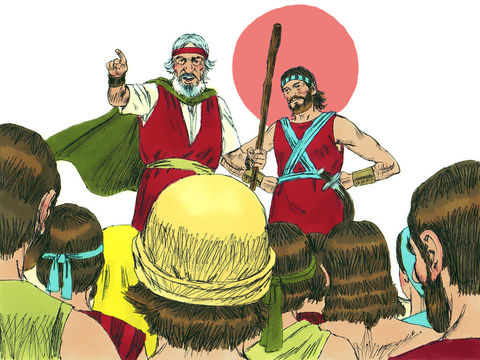
By Janth English
Read Together: The events at Kadesh marked a crucial point in Moses’ life. First, Moses’ sister Miriam died there. Next came a day that would change Moses’ future. Once again, the people were complaining about their lack of water, forgetting how God had provided for their needs again and again. All they needed to do was to turn to God and ask Him for His help. Moses went to God and asked Him to provide the water they needed. God patiently gave Moses and Aaron instructions, telling them exactly how to provide for the people. He told Moses to speak to the rock and water would flow from it. Moses, however, lost his temper. He was so angry at the Israelites that he hit the rock with his rod. In fact, he hit it twice! God made water start miraculously pouring out of the rock, providing for the needs of the thirsty people. But He was very displeased with Moses. According to God, Moses and Aaron did not show honor and respect to Him. Moses had allowed his anger to guide his actions instead of trusting God’s hand and obeying Him as He had instructed .
God does not play favorites, and this act of disobedience on the part of Moses and Aaron in front of all the people was just as wrong as the disobedience shown by others. Because they disobeyed God, Moses and Aaron were not allowed to enter the Promised Land. However, before he died, Moses reminded the people of Israel to never forget the laws of their God. He encouraged them, saying that if they obeyed, God would bless their families, give rain in its season, increase their crops, increase their livestock, protect them from their enemies, and give them peace. However, if they disobeyed, they would be cursed. The weather would be harsh, the earth would not yield its crops, disease would cling to the people, their enemies would pursue them and overtake them, and they would eventually become slaves again. God gave Israel a clear choice between living the way that brings life and peace, or the way that brings curses and death. He gives us the same choice.
Read Together: Numbers 20:1–13, 23–29; 27:12–14; Deuteronomy 28:1–37; 30:1–3, 15–20.
Discuss:
- Discuss with your child Moses’ and Aaron’s punishment for disobeying God. Was this an unfair punishment?
- Even though God punished Moses and Aaron for their disobedience, God forgave them. We know that Moses will have a high position in the Kingdom. Explain the fact that even though God forgives us, sin still has consequences.
- Explain to your child that there are only two ways to live, God’s way and man’s way. God’s way is the only way that brings true joy, peace, and happiness. This may be a good opportunity to discuss the difference between the world today (governed by man) and the Kingdom of God (governed by God).
- Point out to your child that even when we sin, God offers us forgiveness when we repent and turn to Him.
Review Memorization.
Deuteronomy 30:15–16 “See, I have set before you today life and good, death and evil, in that I command you today to love the LORD your God, to walk in His ways, and to keep His commandments, His statutes, and His judgments, that you may live and multiply; and the LORD your God will bless you in the land which you go to possess.”

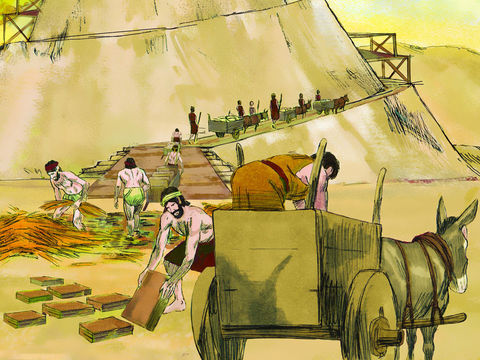
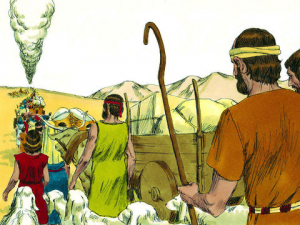

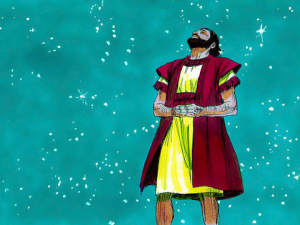
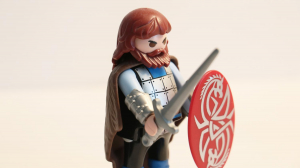 Read Together: After the flood, people began to raise families, and gradually moved further and further away from where the ark had come to rest. The Bible tells us about the families of Shem, Ham, and Japheth, and how they began to populate the earth. We read about one man who became famous as a great hunter. This man’s name was Nimrod, and he was the grandson of Ham, one of Noah’s three sons. As his fame grew, he was idolized by many. In fact, some people began to look to Nimrod instead of God for protection and leadership. They called him “the mighty hunter before [“instead of” or “in place of”] the Lord” (Genesis 10:9). Remember, God had commanded the sons of Noah to fill the earth (Genesis 9:1). But proud Nimrod rebelled against God, building cities and a kingdom. One of the cities he built was the famous Babel, where the people began to build a giant tower, reaching into the sky.
Read Together: After the flood, people began to raise families, and gradually moved further and further away from where the ark had come to rest. The Bible tells us about the families of Shem, Ham, and Japheth, and how they began to populate the earth. We read about one man who became famous as a great hunter. This man’s name was Nimrod, and he was the grandson of Ham, one of Noah’s three sons. As his fame grew, he was idolized by many. In fact, some people began to look to Nimrod instead of God for protection and leadership. They called him “the mighty hunter before [“instead of” or “in place of”] the Lord” (Genesis 10:9). Remember, God had commanded the sons of Noah to fill the earth (Genesis 9:1). But proud Nimrod rebelled against God, building cities and a kingdom. One of the cities he built was the famous Babel, where the people began to build a giant tower, reaching into the sky.
 “We’ve got to speak truth to our neighbor, and any employer is our neighbor, in the context that God uses. … You can be a false witness of yourself, if you don’t tell the truth.”
“We’ve got to speak truth to our neighbor, and any employer is our neighbor, in the context that God uses. … You can be a false witness of yourself, if you don’t tell the truth.”